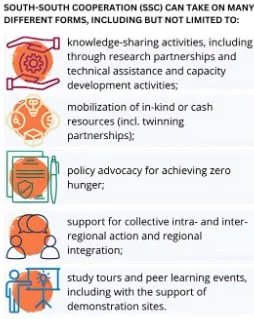Syllabus :GS 2/IR
In News
The United Nations International Day of South-South Cooperation was observed .
- This year’s theme is “A better tomorrow through South-South Cooperation.”
About the day
- It is observed annually on September 12, as established by General Assembly resolution 58/220.
- This date commemorates the adoption of the Buenos Aires Plan of Action (BAPA) in 1978, which promotes technical cooperation among developing countries.
South-South cooperation
- It refers to the collaboration among countries in the Global South to address common development challenges, share knowledge, and build collective capacities.
- The concept of cooperation among developing countries originated from the Afro-Asian Conference held in Bandung in 1955.
- This Conference led to the establishment of the Non-Aligned Movement in 1961 and the creation of the Group of 77 (G-77) in 1964. The G-77 mainly promoted South-South Cooperation in the 1960s and 1970s.
Importance and Need
- South-South cooperation involves developing countries collaborating in various domains such as political, economic, and technical areas, either bilaterally, regionally, or interregionally.
- It aims to share knowledge, skills, and resources to achieve development goals. Triangular cooperation, a related modality, includes support from traditional donors and multilateral organizations to facilitate these initiatives.
- The goals of South-South cooperation are to enhance self-reliance, promote collective problem-solving, and support the least developed and most vulnerable countries in their development efforts.
- South-South cooperation is key to achieving SDG 17, which focuses on revitalizing the global partnership for sustainable development.
- It also supports SDG 11, which aims to make cities inclusive, safe, resilient, and sustainable.

Global Efforts
- The United Nations Office for South-South Cooperation (UNOSSC) : It was created in 1974 to promote, coordinate and support South-South and triangular cooperation globally and within the United Nations system.
- The “South-South Galaxy” : It is a global knowledge-sharing and partnership platform launched in 2019. The project aims to give systematic and effective support to countries of the South, so they can connect, learn and collaborate with potential partners in the wider digital world.
- South-South and Triangular Cooperation (SSTC): SSTC supports development across sectors like agriculture, health, and education. It fosters mutual benefit, respect, and non-conditional partnerships, contributing to more resilient and sustainable societies.
- The World Food Programme (WFP) has been actively involved in facilitating SSTC, utilizing mechanisms like the South-South Trust Fund. In 2023, it supported 60 of 85 countries in engaging in SSTC initiatives.
India’s Approach
- Principles of global “South-South cooperation” guided India’s warm and friendly relations with all African countries.
- India has played a significant role in SSTC through projects like the Pan-African e-Network, India-Brazil-South Africa Fund, and International Solar Alliance (ISA).
- India has invested about $107 billion in SSTC since 1947.
- The G20 summit has solidified India as a leading voice for developing nations.
- The inclusion of the African Union in the G20 strengthens India’s global position and partnerships.
Issues and Challenges
- SSC does not sufficiently tackle the ongoing effects of colonization and risks promoting neo-colonial ideas.
- SSC lacks a strong institutional framework, limiting its efficiency and sustainability.
- SSC does not fully represent India’s development cooperation objectives or its role as a significant international player.
Conclusion and Way Forward
- South-South cooperation is a manifestation of solidarity among peoples and countries of the South and it remains important in addressing global challenges such as climate change, conflict, and food insecurity.
- Therefore it is important to strengthen South-South cooperation which requires innovative financing, a demand-driven approach, knowledge sharing, and sustainability in environmental, social, and economic dimensions.
- The active involvement of Southern countries in global governance and development through SSTC reflects a significant shift in international cooperation norms, supporting the 2030 Agenda for sustainable development.
Source: AIR
Previous article
4 Years of Pradhan Mantri Matsya Sampada Yojana (PMMSY)
Next article
Delhi Declaration on Civil Aviation